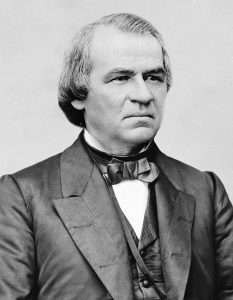The Volokh Conspiracy
Mostly law professors | Sometimes contrarian | Often libertarian | Always independent
Today in Supreme Court History: February 21, 1868
2/21/1868: President Johnson orders Secretary of War Edwin Stanton removed from office. In Myers v. U.S. (1926), the Supreme Court found that Johnson's actions were lawful.

Editor's Note: We invite comments and request that they be civil and on-topic. We do not moderate or assume any responsibility for comments, which are owned by the readers who post them. Comments do not represent the views of Reason.com or Reason Foundation. We reserve the right to delete any comment for any reason at any time. Comments may only be edited within 5 minutes of posting. Report abuses.
Please to post comments


Thankyou for this josh
Gab
What would have happened had Lincoln been shot in January of 1865 instead of April?
Then VP Hannibal Hamlin would have become President -- but what would have happened next? Would VP-Elect Johnson have then become President in March (which is when inauguration day used to be)?
Hamlin was from Bangor, ME and not as radical as Sumner & Stevens -- one can wonder how things would have been different had he stepped in for Lincoln -- or Lincoln not been shot.
Until the 20th Amendment (1933), the Constitution was silent on what happens when a President-elect dies before taking office. Likely they would have reasoned the sensible thing was to let Johnson be sworn in as President on March 4. Which would have given him enough time to screw up the ending of the war. Given his Southern roots and sympathies, he could have revisited what Alexander Stephens was pushing for at Hampton Roads and let the Confederate states rejoin without having to give up slavery.
I'm not so sure they would have sworn in Johnson -- it was still wartime and his loyalties were questionable.
As to the 13th Amendment, well didn't Johnson veto the 14th? A peace settlement is different from letting the states rejoin, and not ending slavery would have been politically incendiary to the Northern states due to the war carnage.
Beyond that, how much longer would slavery have been economically viable -- if at all. The advantage of the share cropper system was that you didn't have to feed & clothe & shelter the sharecropper -- while you did the slave. With all the war damage, I'm not so sure that people could have afforded slavery.
The importation of new slaves had been banned in 1808, there definitely wouldn't be Federal enforcement of any Fugitive Slave laws, and I'm not so sure slavery could have continued.
Presidents don't get to veto constitutional amendments since they're not legislation in the usual sense. Fortunately since some of the amendments concern the Presidency (12th, 20th and 22nd.)
You may be thinking of the Civil Rights act of 1866, which Johnson did veto, but Congress overrode his veto.
What was all that rush?